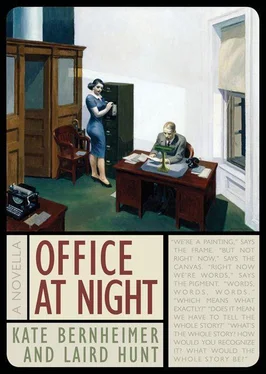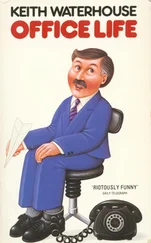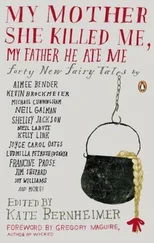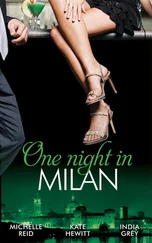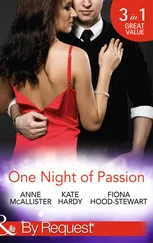Kate Bernheimer - Office at Night
Здесь есть возможность читать онлайн «Kate Bernheimer - Office at Night» весь текст электронной книги совершенно бесплатно (целиком полную версию без сокращений). В некоторых случаях можно слушать аудио, скачать через торрент в формате fb2 и присутствует краткое содержание. Год выпуска: 2014, Издательство: Coffee House Press, Жанр: Современная проза, на английском языке. Описание произведения, (предисловие) а так же отзывы посетителей доступны на портале библиотеки ЛибКат.
- Название:Office at Night
- Автор:
- Издательство:Coffee House Press
- Жанр:
- Год:2014
- ISBN:нет данных
- Рейтинг книги:3 / 5. Голосов: 1
-
Избранное:Добавить в избранное
- Отзывы:
-
Ваша оценка:
- 60
- 1
- 2
- 3
- 4
- 5
Office at Night: краткое содержание, описание и аннотация
Предлагаем к чтению аннотацию, описание, краткое содержание или предисловие (зависит от того, что написал сам автор книги «Office at Night»). Если вы не нашли необходимую информацию о книге — напишите в комментариях, мы постараемся отыскать её.
Office at Night — читать онлайн бесплатно полную книгу (весь текст) целиком
Ниже представлен текст книги, разбитый по страницам. Система сохранения места последней прочитанной страницы, позволяет с удобством читать онлайн бесплатно книгу «Office at Night», без необходимости каждый раз заново искать на чём Вы остановились. Поставьте закладку, и сможете в любой момент перейти на страницу, на которой закончили чтение.
Интервал:
Закладка:
What worries me is that Quinn always stays late. Mr. C. says she’s motivated, she’s the most motivated and mysterious stenographer he has ever known, and I’m worried. He’s vulnerable, Mr. C., to certain sensations — no need to go in the gutter with that. I mean he admires ambition, but the first thing to know about business is it isn’t personal. Personal ambition is the opposite of his father’s ideals, and it is the opposite of how to get where we’re going, and I should know, because I’ve read all the mail. I also designed the communication system, the one with the mailroom that doesn’t exist, but as far as Mr. C. is concerned it exists, and apparently, according to him, it is very, very real, because he frequently refers to the mailroom. According to him, it’s down in the basement, which you can only get to by taking the stairwell to the door that’s marked B. I discovered, my first day of work, that the drawer key opens this door. Behind the door is a room full of filing cabinets, locked. My key does not open these files and they’re covered with dust and with grime, and the one closest to the door — the one illuminated by the light of the stairwell — has a heart drawn in the grime by a finger, with two initials inside joined by a + and outside the heart, a finger has scraped in a word that might read forever or never .

It was not Hester Chan’s desire to become a secretary — since I am a light, I can say this with confidence; I shine a light on every desire, and every lack of desire.
It was Hester Chan’s hope that she could — like her father — work at the hand laundry only six blocks away from their Chinatown flat. She had wanted to work in the back room of the hand laundry — it opened onto an alley where the laundresses stood during their work breaks and smoked. Hester’s older brother, who, if he wasn’t her brother, if it wasn’t so wrong, she’d think of as a half-Chinese Jimmy Stewart (Jimmy Stewart being her favorite actor, since he had appeared in her favorite play about an imaginary rabbit). Hester’s brother, who, like Hester, wasn’t half Chinese at all, but maybe an eighth, nobody knew, and both Hester and her brother had such an elegant look — I shone a light on it carefully when visitors came, delicately tilting my neck.
Hester’s brother always had some adorable girl waiting for him on the stoop, and had told her that the laundry workers smoked opium, and that he smoked it too.
Even though laundry work is especially wearisome — soaking, scrubbing, and ironing of clothing by hand, often in rather uncomfortable circumstances, overly hot or overly cold — Hester enjoys wearisome work. She enjoys wearisome work of this kind in particular, the kind that involves water and fabric, electricity, steam — not human beings. She is not a self-punishing sort, but she’s not very ambitious either, in some significant ways. Yet more to the point, she detests entanglements, intrigue. It is difficult, for this reason, to know precisely how Harvey —the play about Jimmy Stewart and his imaginary rabbit, which had been put on a couple of years ago — had cemented the actor as her ideal sort of man. Yet a man, a perfectly wonderful man with a constant wild look in his eyes, with a long body that was lazy and sensual and really quite strange — a man having an invisible, huge talking rabbit as a best friend is not the same as a man having a tedious entanglement with any old human. Which is the sort of intrigue most humans enjoyed.
And who could blame the encouragers, really? Those who wanted Hester to have more aspiration, that is. As a laundry worker, her daily routine would have consisted mainly of working, eating, then sleeping. A laundry worker sometimes had shifts of more than twelve hours a day. No doubt her parents wished better for her, you say? Sure, maybe. Who wouldn’t want better for such a beautiful specimen, really? Hell, I wanted better for her. She never knew what it was like to be loved. She could have — once — but I’m getting ahead of myself.
As a secretary, she was only employed for eight hours a day, with one hour for lunch. Hester did not understand who in their right mind needed an hour for lunch. Though the conditions would have been bad, she would rather have worked in the laundry; there, they had political meetings and opium instead of automat lunches. Or so it was rumored — mainly by her older brother, who was basically a real jerk and not to be trusted.
Hester watched him smoke, staring off into the distance. He was very self-aware, that one. He knew exactly how to create his own image — it was clever, the technique by which he drew himself into Hester’s sad story. Even after she no longer worked in the office, he was often outside on the street, looking up at the open window.
And the story with which we are concerned here — the story lit up in the dark of the night — concerns not how Hester became a secretary, not Hester’s longing for another mode of employment, and not even the work that took place in this room.
It has to do with the open window at night, you see.

My dear colleague, the little green desk lamp, shines fine specific light on a subject that might more greatly benefit from my more varied portfolio. I derive from multiple sources and so perceive many things, move in many directions, see, am, and are many lives. I am the light, you see and that you see, of the diner across the street. I am the light of the all-night bakery where Moishe Pnipkin boils his heavenly bagels, which sits beside the diner. I am the light of Ravi Fengler’s apartment. I am the light of Constance Rumio’s. Of Allan Park-stone’s, Gwyneth Burdock’s, Merry Gladstone’s. I am the light of Whisper and Janice Kim’s impeccable but illegal tailoring and seamstress service on the fourth floor, where they are right this moment dancing — ah, if only you could see them — before their bright window to the barely muted sounds of Belle Baker in the middle of their single, cloth-strewn room. I am the light of the bare bulb shining evermore dimly in the home of Jessie Rae Waltz, whose Victrola Whisper and Janice are listening to. He is sad right now, is Jessie, and owns only three records, one of them badly scratched. As he sits with his head in his hands, only altering his position to attend to the Victrola, Janice and Whisper will dance to them all.
I am the light of the bathroom window at Big Anna’s just above them. She has two customers. They are all sitting together on her couch, their legs and buttocks adhering. Getting sticky. I am the light at the tip of the cigarettes in all their mouths, light that grows and fades, fades and grows. I am the light of the four cars idling at this moment on the street. One is bound for Harlem, two, curiously enough, for Flatbush (they have “business”), and one will just sit there idling until its gas runs out. More cars are coming. There are always more cars. On and on. I am the light of the trucks whose exhaust Marge Quinn so dislikes — there are two of them right now. One is filled with turquoise-and-golden toy motorcycles bound for cheap shops scattered throughout the city. The other is empty. Its driver is waiting, circling, over and over. Stopping every fourth or fifth round at this corner. He has a heart problem. It is hard not to hate it when he eats his mashed-meat sandwiches. He buys them by the half dozen. Small but heavy. He is often, as he is now, holding one in his hand.
I am the light of the streetlamp. Of course I am. If you want to play percentages, I am mostly it and it is mostly me. You can see it/me for seven blocks. So now you know I can see things. All kinds of things. More than my little desk lamp friend with her little green shade. Or the file cabinet whose nice fat flank I glaze (though neither of us grows sticky).
Читать дальшеИнтервал:
Закладка:
Похожие книги на «Office at Night»
Представляем Вашему вниманию похожие книги на «Office at Night» списком для выбора. Мы отобрали схожую по названию и смыслу литературу в надежде предоставить читателям больше вариантов отыскать новые, интересные, ещё непрочитанные произведения.
Обсуждение, отзывы о книге «Office at Night» и просто собственные мнения читателей. Оставьте ваши комментарии, напишите, что Вы думаете о произведении, его смысле или главных героях. Укажите что конкретно понравилось, а что нет, и почему Вы так считаете.
